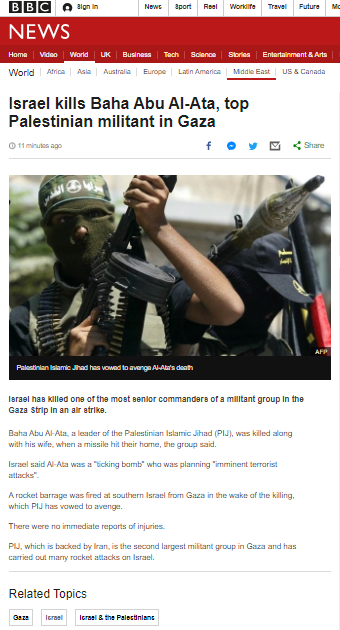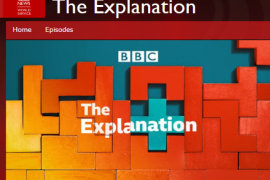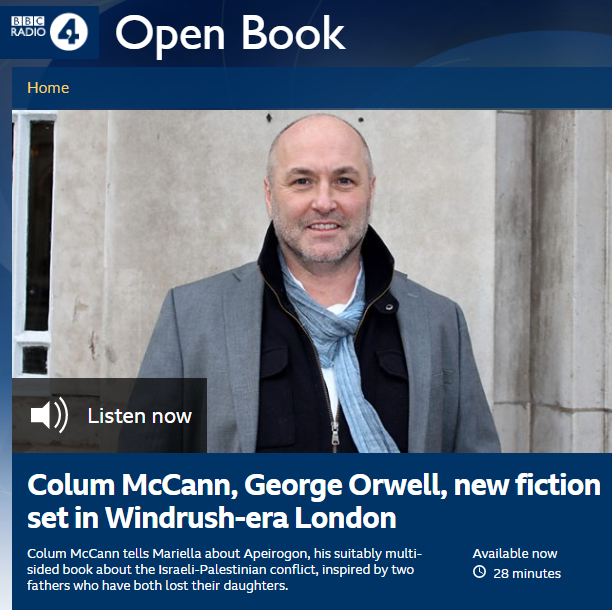As has been the case in previous years (see related articles below), Israel related content produced by the BBC during 2018 frequently included contributions or information sourced from non-governmental organisations (NGOs).
Often portrayed by the BBC as ‘human rights groups’, those agenda-driven organisations make no claim to provide unbiased information and are not committed to the BBC’s editorial standards. When political agendas and journalism meet, questions obviously arise concerning accuracy, impartiality and reliability. Currently one of the few safeguards in place comes in the form of the section in the BBC editorial guidelines on impartiality that states: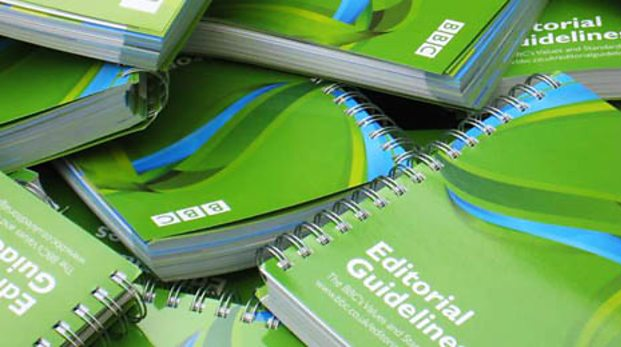
“We should not automatically assume that contributors from other organisations (such as academics, journalists, researchers and representatives of charities) are unbiased and we may need to make it clear to the audience when contributors are associated with a particular viewpoint, if it is not apparent from their contribution or from the context in which their contribution is made.”
However, throughout 2018 BBC Watch once again documented numerous examples of that clause not having been upheld in Middle East related content which was sourced in one way or another from political NGOs or their representatives.
The BBC’s collaboration with political NGOs comes in a variety of forms. In some cases people associated with NGOs are interviewed or quoted in BBC reporting – but their links to those organisations are not always adequately clarified to audiences.
In January 2018, for example, the BBC’s Yolande Knell quoted “an Israeli peace activist” but refrained from identifying him as a founder of the extremist group ‘Anarchists Against the Wall’. Also in January, a BBC News website report quoted “an Israeli anti-settlement watchdog” but failed to provide readers with the name of the organisation.
In July 2018 the BBC Radio 4 programme ‘Woman’s Hour’ featured a “writer and cook” who had “worked as a human rights campaigner for a very long time” but failed to inform listeners of the relevant fact that her campaigning had been done with the anti-Israel NGO ‘War on Want’. In October BBC Radio 4 interviewed a “Palestinian academic” without clarifying that he was the founder of the political NGO PASSIA.
More frequently the BBC directly amplifies statements and/or material produced by NGOs and throughout the past year such content – including direct links to campaigns on NGO websites – featured particularly prominently in some of the stories the BBC chose to highlight.
BBC coverage of the Ahed Tamimi story, for example, included repeated promotion of the viewpoint of B’tselem including interviews with its research director (see here and here) but with no mention made of the Tamimi family’s connections to that organisation. Additional coverage of the same story included quotes from Amnesty International even promoted a link to the NGO’s relevant campaign webpage. Another report promoted the views of Human Rights Watch without clarifying that it had been campaigning on Tamimi’s behalf and the same report even included a link directing audiences to a petition promoted by the political campaigning group Avaaz.
BBC coverage of the ‘Great Return March’ story included promotion of a link to a campaign calling for Israeli soldiers to refuse orders on the website of B’tselem. A representative of B’tselem was interviewed in another BBC report and the NGO was referred to as “a leading Israeli rights group” in another. A BBC News website live webpage on the same story featured quotes from B’tselem and Amnesty International and a BBC radio presenter quoted “the Israeli rights group” Adalah. The political NGO ‘Gisha’ was quoted in two related reports.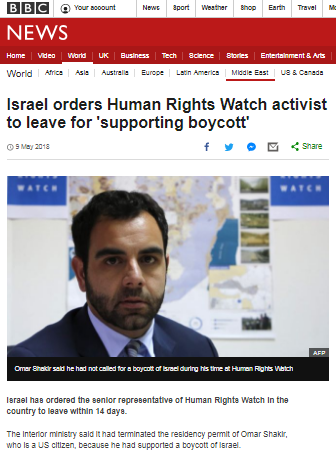
Amnesty International was quoted in a BBC Sport report about a cycle race and later the same month the same NGO was quoted in another report along with Human Rights Watch and B’tselem. In June the BBC uncritically quoted a “campaign director at Avaaz” and later the same month BBC Radio 4 interviewed the “executive director of the international human rights organisation ‘Human Rights Watch’”.
Adalah was quoted in a BBC report concerning Israeli legislation in July and BBC News website coverage of the Khan al Ahmar story included promotion of a link to the B’tselem website. BBC News website coverage of the Airbnb story included quotes from Human Rights Watch as well as a link to a report produced by that political NGO and another called ‘Kerem Navot’. Another report by Human Rights Watch was the topic of a BBC News website report in October.
A member of the NGO ‘Breaking the Silence’ was featured on the BBC’s ‘Hardtalk’ programme in February and on the BBC Radio 4 ‘Today’ programme in May. Additional examples of the BBC’s failure to adequately clarify to audiences the political agenda of NGOs represented by interviewees involve the ‘Norwegian Refugee Council‘, ‘Minds of Peace’, the ‘Foundation for Middle East Peace’, the ‘Oxford Research Group’, ‘Save the Children’ and ‘Embrace the Middle East’.
Once again the most widely promoted local NGO in 2018 was B’tselem. Among the foreign NGOs quoted and promoted in BBC content, Human Rights Watch (HRW) was once again the most prominent, closely followed by Amnesty International.
As in previous years, more often than not the political agendas of the NGOs quoted and promoted were not adequately clarified to audiences as demanded by BBC editorial guidelines on impartiality. The BBC’s serial failure to meet its own editorial guidelines by clarifying the “particular viewpoint” of quoted NGOs and representatives of those organisations interviewed by the BBC (including in certain cases the fact that they are involved in lawfare campaigns against Israel) means that audiences remain unaware of the fact that the information they are receiving comes predominantly from one side of the political spectrum and hence is consistently unbalanced.
Related Articles:
Promoted and quoted: the BBC’s preferred Middle East NGOs
Promoted and quoted: the BBC’s preferred NGO contributors in 2014
Promoted and quoted: the BBC’s preferred NGO contributors in 2015
Promoted and quoted: the BBC’s preferred NGO contributors in 2016
Promoted and quoted: the BBC’s preferred NGO contributors in 2017
BBC bases rejection of complaint on word of anti-Israel NGOs

